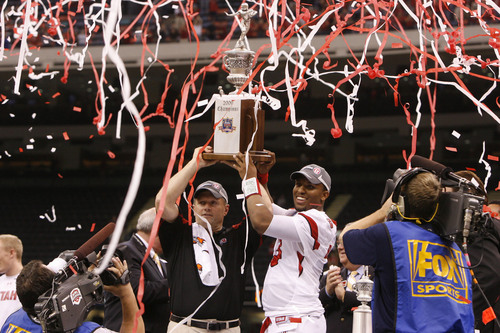This is an archived article that was published on sltrib.com in 2014, and information in the article may be outdated. It is provided only for personal research purposes and may not be reprinted.
The Utah Utes might have been preparing for another game instead of parading down State Street after beating Alabama in the Sugar Bowl five years ago.
Rather than having a month to get ready for Monday's BCS National Championship Game, Florida State and Auburn would have played semifinal contests on New Year's Day.
As the maligned Bowl Championship Series goes away, here's a final tribute to a system that actually was very good to Utah and a welcome to a formula that has won me over, on the basis of simple math: The College Football Playoff will deliver three highly meaningful games, not just one.
And it means Utah never again will finish 13-0 and feel unfulfilled. After the Sugar Bowl, asked about a hypothetical meeting with Florida, Ute coach Kyle Whittingham said, "You tell us where to be and when to be there, and we will be there, I can tell you that."
In the playoff format, the Utes would have known where they were headed next. Yet before history is revised too much in our imaginations, here's the reality: Utah may not have been invited in 2008. That would have been unfair, certainly. But looking back, the Utes should appreciate what the BCS did for them, rather than just wish the playoff had come sooner.
We'll never know what a selection committee would have done — or precisely what criteria the group will use, beginning next season. But in 2004, when USC, Oklahoma and Auburn also were unbeaten, Utah would have competed with Texas and California for the No. 4 spot. The Utes were No. 5 in the last AP Top 25 of the regular season and No. 6 in the BCS standings, sending them to the Fiesta Bowl vs. Pittsburgh.
The 2008 Utes played high-profile games vs. TCU and BYU in the Mountain West and were the only unbeaten team. Yet the Utes again were No. 6 in the BCS and only No. 7 in the AP poll, so a committee would have had to make a subjective pick to include them over Alabama or USC.
As it was, just getting to the Sugar Bowl basically earned Whittingham two contract extensions and increased the Utes' marketability to the Pac-12.
The next issue is whether the Utes can take advantage of the opportunity the Pac-12 gives them. Stanford probably wouldn't have made the four-team cut with two defeats — thanks partly to Utah — but a one-loss Pac-12 champion should make the playoffs.
Other nice opportunities exist outside of the playoffs for Utah schools, just as in the BCS era. When they're not hosting a semifinal game, the Fiesta, Chick-fil-A and Cotton bowls will be filled by the selection committee, which brings BYU into play. As for Utah State, the highest-rated member of a league outside of the power conferences is promised a spot.
So the kind of big-bowl access the BCS provided basically is intact, and the playoff will enhance the postseason.
But there's a trade-off. The regular season will be devalued just enough to change college football as we know it. In the case of 2013, Alabama's stunning loss to Auburn would have affected only the Crimson Tide's seeding, rather than knocking them out of the playoffs.
Players and coaches also will face the emotional demands of another game, although that's done on all other levels of football.
"It's what we'll have to do, and kids will adjust and they'll adapt," Florida State coach Jimbo Fisher said before Monday's game. "But it's going to be a challenge. It's going to be that much harder to get to where you want to go, that's for sure."
No tougher than it was for the '08 Utes, who had to be told to stop.
Twitter: @tribkurt —



